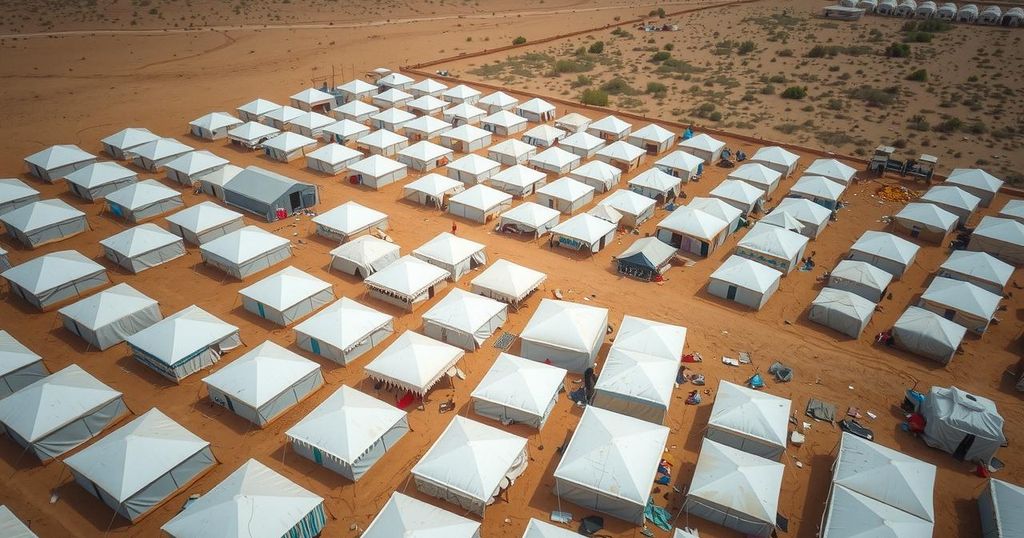UN Warns of Critical Situation for Sudanese Refugees in Libya
Over 200,000 Sudanese refugees have fled to Libya amid ongoing conflict, facing severe human rights abuses. The UN warns of the potential for continued migration to Europe without increased international aid. The situation is critical, particularly for those lacking documentation and facing detention. Urgent assistance is needed to support these vulnerable populations and mitigate further tragic outcomes in their search for safety.
The ongoing war in Sudan has resulted in over 200,000 Sudanese refugees fleeing to Libya, where they face grave human rights violations. The United Nations warns that without adequate assistance, these individuals may attempt to reach Europe. According to the UN Refugee Agency (UNHCR), since the conflict’s outbreak in April 2023, approximately ten million people have been displaced, with around two million having sought refuge in neighboring countries. Libya has become a critical zone for those aiming to continue their journey to Europe or Tunisia.
By January 2025, the number of Sudanese refugees in Libya is estimated at 210,000, a significant portion of whom arrive without identity documents, making them vulnerable to immediate arrest under Libyan law. A lawyer, Omar, noted, “That’s why Sudanese refugees are usually arrested immediately and taken to detention centres or police stations, where we as lawyers have to intervene.” The UNHCR reports that daily, between 400 to 500 Sudanese individuals seek refuge specifically in the district of Alkufra.
Omar, affiliated with the Libyan Anti-torture Network (LAN), cited alarming conditions faced by refugees, including arbitrary arrests, extortion, human trafficking, and various forms of violence. Despite international obligations to protect refugees, many suffer due to Libya’s political turmoil and lack of legal protection. Libya’s dual government structure and presence of armed groups further exacerbate human rights abuses against migrants.
Although Libya has not ratified the 1951 UN Refugee Convention, it has signed an African Union agreement regarding refugees. Legal support for detained refugees can be scarce but feasible in some cases, as Omar explained, “Sometimes we can pay the fine required by Libyan law for release.” However, many remain imprisoned for extended periods, sometimes without trial or justification.
In southern Libya, Sudanese refugees face dire conditions, exacerbated by robbery, homelessness, and instances of sexual violence. Claims have also emerged of child labor exploitation and countless tragic instances of starvation affecting children. Those caught in the clutches of armed factions risk being forcibly returned to Sudan.
Contrary to the south, the northern regions, particularly Tripoli, offer better chances for refugees to register with the UNHCR. Despite the slim likelihood of resettlement, many remain hopeful, as evidenced by 6,000 Sudanese arriving in Italy between early 2023 and April 2024. Nevertheless, many are intercepted by the Libyan Coast Guard and forcibly returned, facing further mistreatment.
UN High Commissioner for Refugees, Filippo Grandi, emphasized the need for richer nations to provide adequate support to prevent Sudanese from risking dangerous migrations. The European Union’s military backing to the Libyan coast guard since 2017 has unfortunately led to numerous human rights violations.
Instances of arrest and detention are commonplace, with refugees lacking basic medical care and experiencing further risks upon return to Libya. Testimonies and investigations confirm a troubling landscape of coerced repatriations and unlawful detentions. The documentation of human rights abuses by LAN seeks to apply international pressure to improve conditions for those affected.
Recent discoveries of mass graves in Libya underline the brutal reality faced by those trying to escape violence, with bodies often unclaimed and buried without identification. The UNHCR continues its advocacy for improved humanitarian conditions and services for refugees along dangerous migration routes. The crisis necessitates urgent international attention and action to prevent further tragedies.
The plight of Sudanese refugees in Libya has reached alarming levels, as they endure severe human rights violations and significant challenges in their search for safety. Despite some opportunities for registration with the UNHCR in northern Libya, the majority continue to face obstacles, including arrest, detention, and the threat of violence. The urgent need for international support is clear, as many refugees are at risk of exploitation and despair, emphasizing the necessity for richer nations to offer humanitarian assistance and sustainable solutions to this humanitarian crisis.
Original Source: www.swissinfo.ch




Post Comment